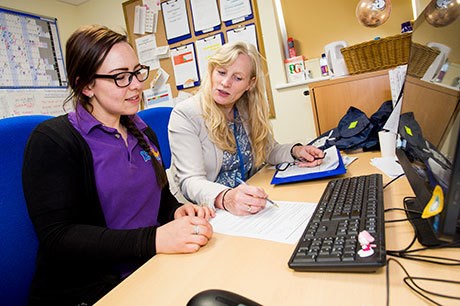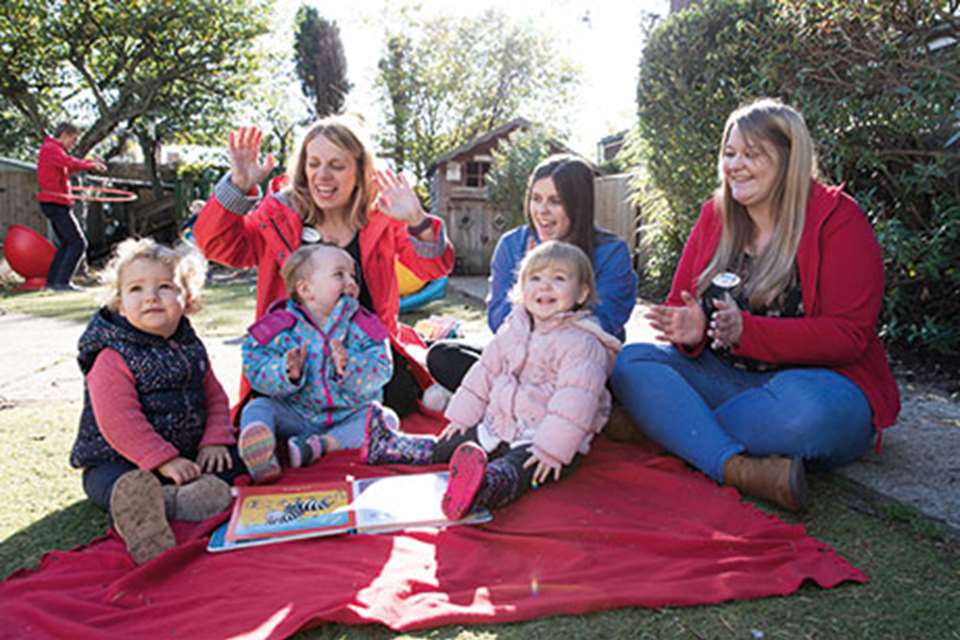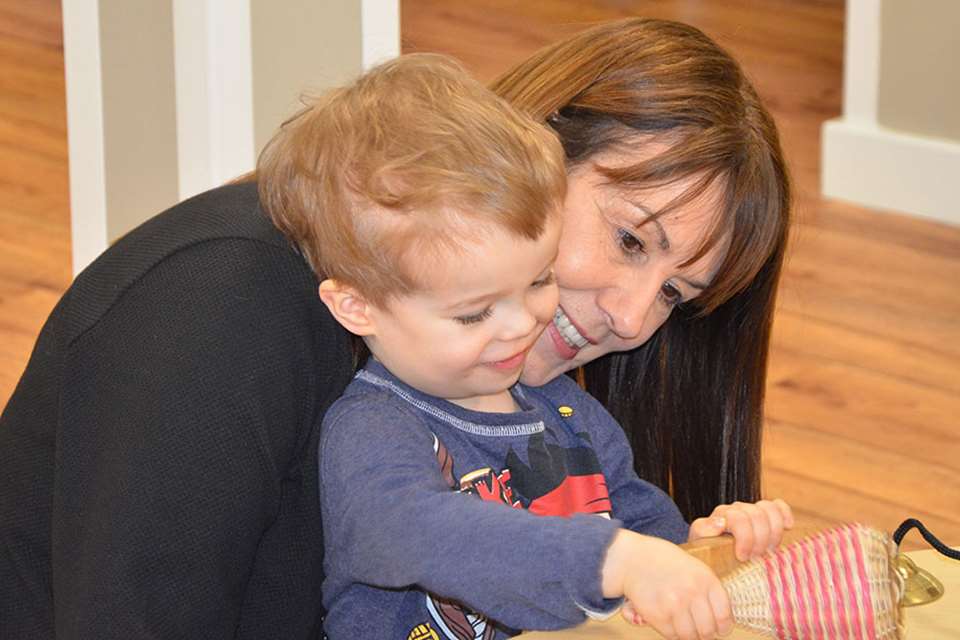Nursery Chains: Mental Health and Well-Being - All in the mind
Monday, November 12, 2018
With a quarter of the workforce considering leaving the profession due to stress, Karen Faux talks to some of the settings that are proactively taking steps to improve staff mental health, well-being and sense of belonging

While workplace stress is a common and well-documented phenomenon, its persistence in the early years sector is particularly alarming due to the negative impact it can have on young children.
Just as children thrive best in families which are happy and secure, they also require well-balanced, positive professionals to lead their learning and development in early years settings. These positive adults are more likely to be able to tune into, and be responsive to, their emotional and learning needs.
But the sustainability of a workforce with these skills appears to be under threat from the current pressures of the job. The Pre-school Learning Alliance’s recent Minds Mattersurvey suggests that a quarter of the existing workforce is actively considering leaving due to stress-related issues.
Early years consultant and author Kay Mathieson, who works closely with nurseries, has observed that an individual who is anxious, stressed and tired will inevitably be using all their emotional energy to try to manage themselves rather than being able to focus on others’ needs.
She says, ‘Consistent practitioner behaviour is likely to be compromised by stress. Anxieties can affect an individual’s problem-solving abilities, resulting in formulaic patterns of response to children. Rules and boundaries may be enforced in an arbitrary fashion rather than in a way that supports a child’s learning in a sensitive and responsive manner.’
Reports of poor practitioner mental health are nothing new, according to early years consultant Kate Moxley. ‘What is new is the correlation between poor mental health and the consequences for children of a sector that seems to be ill-prepared to support practitioners experiencing problems,’ she says.
‘We need a workforce which is physically and mentally resilient. Research now shows that the more adverse experiences a child has, the more physical and mental issues they will have in later life.’
STRESSES OF THE JOB
As the Minds Matter survey emphasises, mental health is a complex and personal issue, and it would be short-sighted to suggest there were any ‘quick fixes’. However, the survey does highlight a number of shared concerns, including the burdens of excessive paperwork and administration, financial insecurity due to inadequate funding, long working hours and low pay.

Kiddi Caru encourages working collaboratively, and managers have an open-door policy
Paperwork is always an issue that arises from staff questionnaires, and many settings have focused on reducing it. At Kiddi Caru Day Nurseries, which employs 1,300 staff, head of HR Claire Joyce says effective use of IT can make a huge difference for staff who are prepared to embrace it.
‘We’re currently phasing in systems such as Tapestry and I-Connect for admin tasks and supporting staff with training. For our core staff demographic of 19 to early 20-year-olds, this is undoubtedly saving time. However, there is no getting away from the essential, everyday aspects of form-filling, such as counting children coming in and out and recording nappy changes, which can be frustrating for staff who are not naturally organised.’
Kiddi Caru attributes its positive staff teams to the emphasis it places on working collaboratively, whether that is around paperwork or any other day-to-day issues.
Managers have an open-door policy that is well-used by staff, even if it is to express a dislike of the company uniform, as was recently the case. While the company prides itself on a low staff turnover, and offers popular incentives to reward long-serving staff, the current recruitment crisis is a challenge.
‘If a nursery has several vacancies, it puts enormous pressure on existing staff who are working in ratio,’ Ms Joyce says. ‘There is a real knock-on effect to the way teams function, with colleagues not being on hand to advise each other or help out, so there is a danger of everyone feeling overwhelmed by their workload. This is something we work hard to address with team meetings and supervisions.’
By the same token, pressure to come into work when ill can have a detrimental effect.
In her work with nurseries, Ms Moxley has become concerned about the current epidemic of ‘presenteeism’, which is the practice of coming into work despite illness, injury or anxiety, resulting in reduced productivity and a negative impact on children.
‘The Office for National Statistics reports a decrease in the amount of sickness days in the UK in recent times,’ she says. ‘We must consider that by continuing to go into work to be “present” to maintain ratios when we are unwell, we are contradicting the very reason we work with children in the first place. We are not just letting ourselves down, we are letting children down.’
TALKING IT THROUGH
Childbase Partnership partly attributes its high Ofsted ratings to staff well-being
Having someone to talk to can make all the difference for staff who are stressed, and this is something that settings are working to address. The Minds Matter survey suggests that more than 50 per cent of the workforce had not spoken to anyone about their difficulties.
At the Childbase Partnership, a council has been set up with 42 elected members representing each of its 41 day nurseries in the South of England and the head office, which is tasked with enhancing communication at every level across the business. With deputy manager Angela Brown the first elected chair of the council, this sends out a strong message.
‘Not only are we listening, we are asking the right questions so we can act appropriately and effectively to avert issues developing,’ says managing director Virginia Mead-Herbert (see Case study, below). ‘This can be as simple as streamlining essential paperwork required by our support teams in health, safety and environment, and quality and training – and moving to paperless planning and child assessments.’
According to a confidential Ceeda analysis, which Childbase Partnership commissioned this year, well-being has significantly contributed to the group’s success, with 80 per cent of its nurseries rated Outstanding and occupancy currently at 92 per cent.
WHOLE-TEAM APPROACH
As part of its efforts to achieve staff well-being, the Portico Nursery Group has opened up communication and focused on a sense of autonomy to motivate staff. Its staff well-being policy has grown organically since 2015, when it reduced its paperwork, and has now reached a stage where staff embrace responsibility and are confident to put forward their own ideas.
Area manager Sarah Fillingham says a whole-team approach to self evaluation is key.
‘This means that all staff are now embedding the peer observation process, and although at different stages, all practitioners across the company are taking charge of their own learning alongside the manager and myself. This has meant that training has become more specific and appropriate for the individuals in the team.’
Creating a well-being policy for the nursery involved pulling together all the policies and procedures that it already had in place. Ms Fillingham says, ‘We looked at well-being and involvement with the managers in a similar way that we do for the children – to help them look at how they could support the well-being and involvement of their own teams. All managers introduced the strategy at their own team meeting where they all completed a stressors questionnaire to look at what stress is, and what stresses them out.
‘The stressors questionnaires really helped people see things from a different perspective and understand the responsibilities that each other’s roles have.’
She reports that all staff are now embedding a peer observation process, and although teams are at different stages, all practitioners are taking charge of their own learning alongside their manager. ‘This means training is much more specific and appropriate to the individual needs of the teams,’ Ms Fillingham says. ‘It means practitioners are receiving more effective support in developing the skills to fulfil their roles.’
As Ms Mathieson points out, ‘We all have good times and bad, and adults and children benefit from being in a sensitive, supportive environment. Mental health issues can be temporary or long term, and the key issue is being aware of, and able to access, the appropriate support.’
While everyone may know that working in early years isn’t the best-paid job in the world, proactive nurseries are increasingly recognising that supporting our staff’s well-being is one important way they can be repaid for all their hard work.
Ms Fillingham believes that recognition isn’t all about money. ‘If practitioners feel wanted and part of the team, are supported to be knowledgeable about their role and are empowered to develop themselves, then I think this is a great motivator and way to develop a loyal and happy team,’ she says.
Case study: promoting team spirit
 Childbase believes happy workplaces are born from a shared vision of what needs to be done individually and collectively to achieve company goals and keep stress levels to a minimum.
Childbase believes happy workplaces are born from a shared vision of what needs to be done individually and collectively to achieve company goals and keep stress levels to a minimum.
On a practical basis this starts with a comprehensive induction process, underpinned by a competency framework, with clearly defined performance expectations, career pathways and training opportunities for each individual. The aim is to not only focus on everyday expectations but also on long-term progress.
‘Mental health is out in the open here,’ says managing director Virginia Mead-Herbert (pictured). ‘Our Mental Health in the Workplace training programme and toolkit for management teams are designed to break down stereotypes and the stigma around it and create an ethos that encourages all 1,950 employee owners at the company to talk about how they are feeling. The toolkit aims to help managers recognise the signs of mental health issues and provide appropriate support.’
Childbase also runs an Employee Assistance Programme, which supplements in-house HR support and is an external ‘round-the-clock’ confidential telephone service operated by trained counsellors with expertise and advice on a wide range of subjects, from legal and financial worries to personal worries and anxieties. Rather than wait for GP referred counselling, it offers employees six face-to-face counselling sessions in their local area or over the phone. Other support includes a Hardship Fund, providing a personal loan facility, and Team Welfare Budgets, which give staff funds to access the type of events they feel will best promote team spirit.
‘Staff have told us it is a real comfort to know there is someone to speak to as part of our counselling service, whenever they need it and whatever the time,’ says Ms Mead-Herbert.
Case study: wall of appreciation
Senior early years practitioner Kellieanne Bicknell, who has worked for Co-operative Childcare for four years, praises the organisation for the way it supported her to come back to work after a difficult pregnancy and birth.
She says, ‘It was a stressful time, particularly as my daughter had suspected epilepsy, and I have experienced stress issues in the past. My manager supported me every step of the way, giving me feedback and confidence. She always wanted to know what was going on with me and would make me a cup of tea and sit me down for a chat.
‘It’s amazing to be able to say that the team really does seem like a family. We all go to each others’ houses and have pizza nights out. This emphasis on building positive relationships carries through to how we work with the children and their families. It’s so important for parents to meet a friendly face and be given a welcome, and this is how we approach all our relationships in the nursery.’
Ms Bicknell says she is excited about the National Practitioner Days launched in October, which recognise the hard work of staff in each of Co-operative’s 44 nurseries. The occasion involved a string of initiatives to make practitioners feel valued, including the opportunity to win a holiday. She also appreciates the Colleague Support Fund, which is there to help staff to claim money for medical essentials as well as paternity and medical leave. And being able to place her daughter in the nursery was enormously helpful when she returned to work.
Her colleague, sales and marketing manager Rachael Escott, says, ‘While we can do a lot as an employer, we know that for our practitioners the feedback they receive from parents and children makes all the difference. The appreciation walls we are installing across our nurseries provide an area for parents and children to leave notes expressing the help and support they’ve received from either an individual colleague or the nursery as a whole.
‘It’s a central point where our practitioners can see the impact they are making to the families we support. The feedback from the appreciation walls will also be shared across the whole network.’









